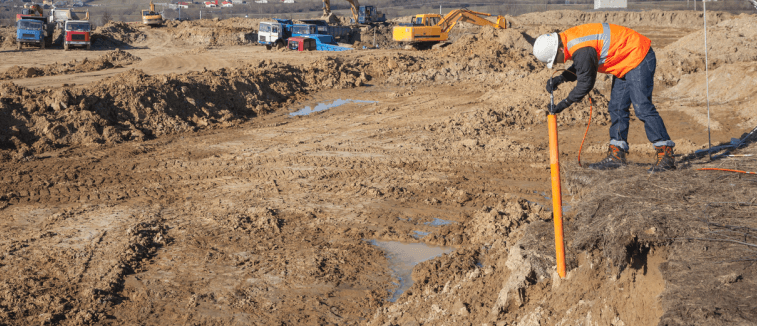An Unbiased View of Geotheta
Table of Contents7 Easy Facts About Geotheta ExplainedWhat Does Geotheta Do?The Greatest Guide To GeothetaThe Single Strategy To Use For GeothetaAll about Geotheta

They carry out website examinations, accumulate examples, perform laboratory tests, and examine information to review the viability of the ground for building and construction projects - Geotechnical Engineers. Based upon their searchings for, geotechnical engineers provide referrals for structure design, incline security, maintaining frameworks, and mitigation of geotechnical risks. They team up with various other experts, such as engineers, structural engineers, and construction groups, to guarantee that geotechnical factors to consider are incorporated into the total job design and implementation
By analyzing the actions and properties of soil and rock, they can identify prospective geotechnical dangers such as landslides, soil settlement, or slope instability. Their know-how assists avoid failures or accidents that could endanger lives and residential or commercial property. Here are some comprehensive responsibilities and responsibilities of a geotechnical engineer: Website Examination: Geotechnical designers conduct website investigations to gather information on subsurface conditions.
They translate the information to comprehend the homes and actions of the dirt and rock, including their strength, permeability, compaction qualities, and groundwater problems. Geotechnical Evaluation and Layout: Geotechnical designers assess the data collected throughout website examinations to analyze the security and viability of the site for construction projects. They carry out geotechnical calculations and modeling to assess factors such as bearing capacity, settlement, slope security, side earth pressures, and groundwater flow.
The Buzz on Geotheta
Structure Style: Geotechnical engineers play a vital role in making foundations that can securely support the designated framework. They analyze the dirt conditions and lots requirements to figure out the suitable structure type, such as shallow foundations (e.g., grounds), deep foundations (e.g (https://triberr.com/geotheta)., heaps), or specialized techniques like dirt renovation. They consider elements such as settlement restrictions, birthing capability, and soil-structure interaction to create optimum foundation layouts
They examine building plans, monitor website tasks, and conduct field assessments to confirm that the design recommendations are followed. If unpredicted geotechnical concerns emerge, they analyze the circumstance and provide suggestions for remediation or modifications to the layout. Risk Assessment and Reduction: Geotechnical designers evaluate geotechnical dangers and dangers related to the project website, such as landslides, liquefaction, or soil erosion.

Cooperation and Interaction: Geotechnical designers function closely with various other experts associated with a job, such as architects, architectural designers, and building groups. Efficient communication and collaboration are vital to integrate geotechnical considerations into the general project style and building procedure. Geotechnical engineers give technical competence, solution inquiries, and make certain that geotechnical demands are fulfilled.
Geotheta Fundamentals Explained
Below are some types of geotechnical engineers: Foundation Engineer: Foundation engineers focus on creating and examining structures for structures. They examine the dirt conditions, tons demands, and site attributes to figure out one of the most ideal structure kind and design, such as shallow structures, deep structures, or specialized methods like stack foundations.
They assess the factors influencing incline security, such as soil properties, groundwater conditions, and slope geometry, and establish methods to stop slope failures and mitigate threats. Quake Engineer: Quake designers focus on evaluating and designing frameworks to hold up against seismic pressures. They assess the seismic hazard of a website, evaluate dirt liquefaction capacity, and create seismic style criteria to ensure the safety and security and durability of frameworks during quakes.
They execute field screening, gather samples, and examine the gathered information to characterize the dirt buildings, geologic formations, and groundwater problems at a website. Geotechnical Instrumentation Designer: Geotechnical instrumentation engineers concentrate on surveillance and determining the behavior of dirt, rock, and structures. They mount and preserve instrumentation systems that check aspects such as soil negotiation, groundwater degrees, slope activities, and structural variations to evaluate efficiency and provide very early warnings of prospective concerns.
Geotheta Can Be Fun For Everyone
They conduct tests such as triaxial examinations, consolidation examinations, straight shear examinations, and leaks in the structure tests to gather data for geotechnical analysis and style. Geosynthetics Engineer: Geosynthetics designers specialize in the layout and application of geosynthetic materials, such as geotextiles, geogrids, and geomembranes. They use these materials to enhance dirt security, enhance inclines, provide drain services, and control erosion.
They have a tendency to be investigatory people, which suggests they're intellectual, reflective, and inquisitive. They wonder, methodical, reasonable, logical, and rational. A few of them are likewise social, indicating they're kind, generous, cooperative, client, caring, valuable, compassionate, tactful, and friendly. Does this seem like you? Take our free career examination to locate out if geotechnical designer is among your top job suits.
In the office setting, geotechnical engineers make use of specialized software program tools to execute computations, create layouts, and evaluate information. They prepare records, review task specs, communicate with customers and staff member, and coordinate job activities. The workplace setting supplies a conducive environment for study, evaluation, and cooperation with various other experts included in the project.
The 45-Second Trick For Geotheta
They frequently check out job sites to perform website examinations, assess geotechnical conditions, and collect information for evaluation. These sees entail traveling to different locations, in some cases in remote or challenging surfaces. Geotechnical designers might do dirt tasting, conduct tests, and screen construction tasks to make sure that the geotechnical facets of the task are being applied properly.
Geotechnical engineers also function in specialized geotechnical research laboratories. Geotechnical research laboratory designers function thoroughly in these atmospheres, managing screening devices, running instruments, and tape-recording data.